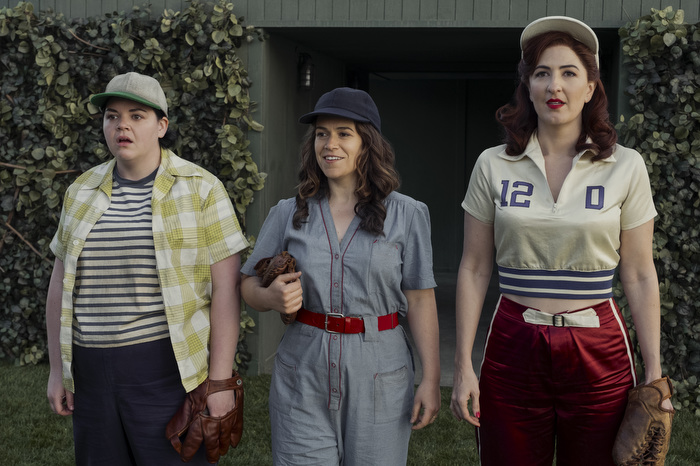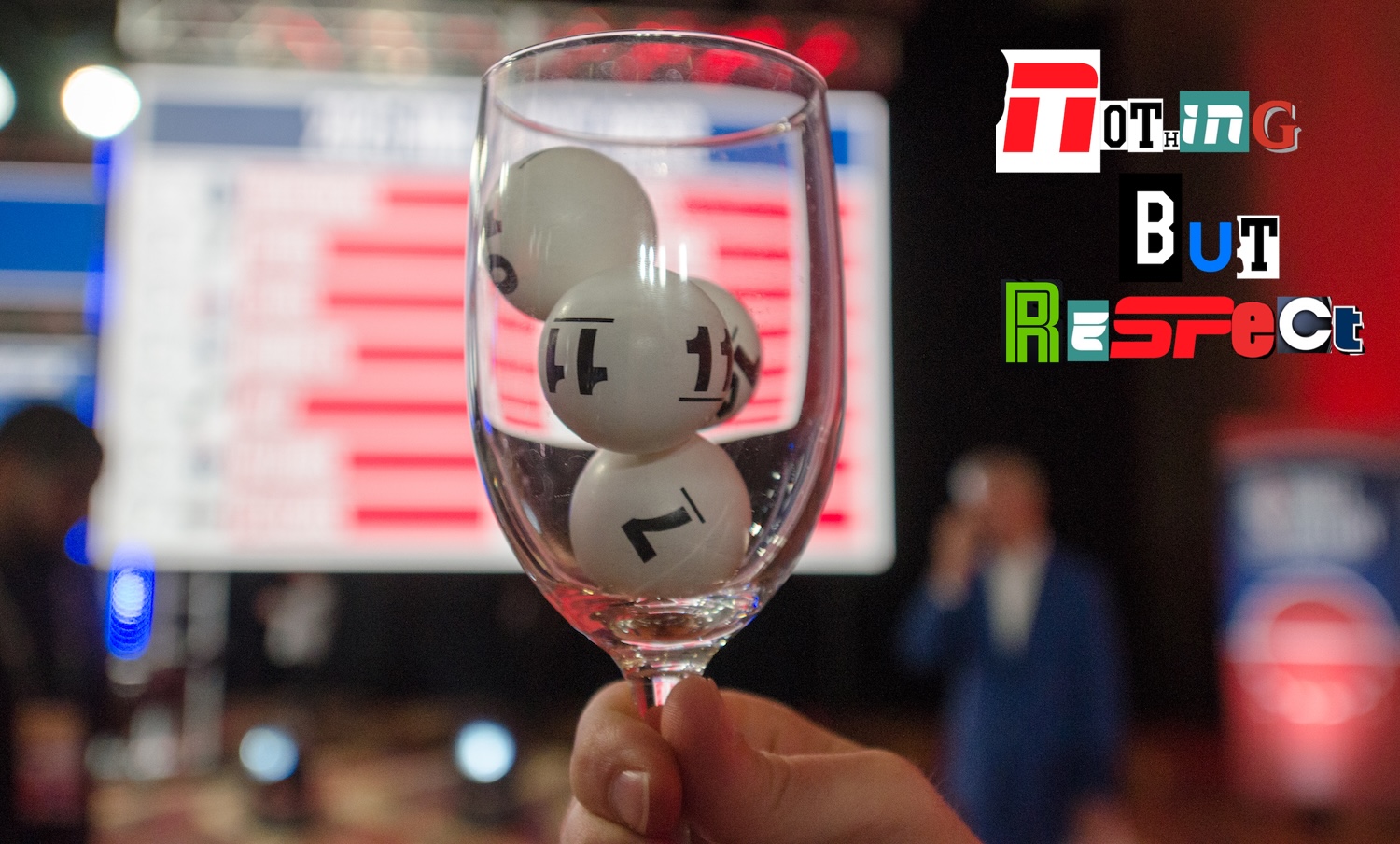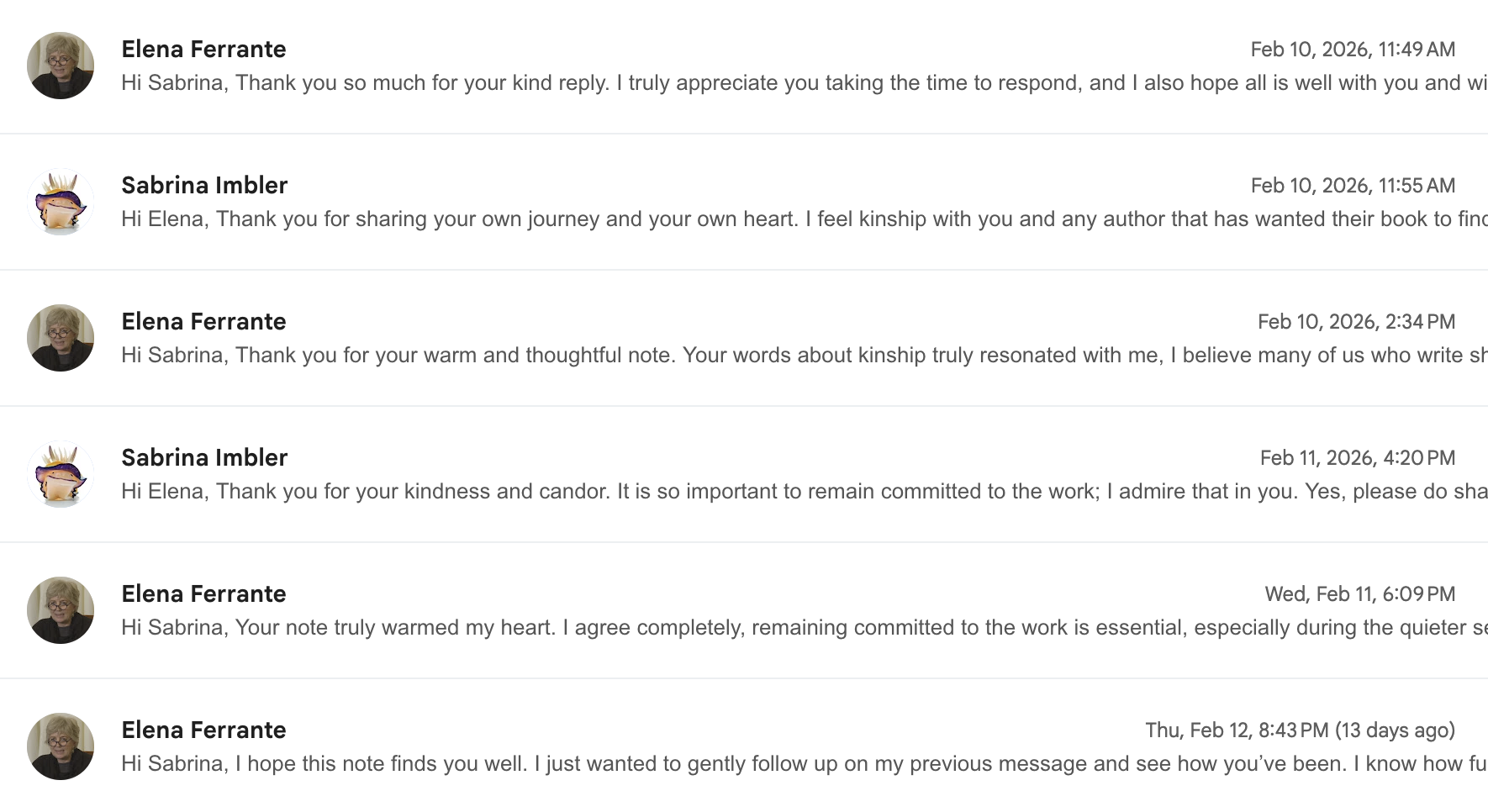I cried while watching almost every episode of the new TV series A League of Their Own. It took me weeks to start it, even though I've had the premiere date on my calendar for months. I have long loved Abbi Jacobson's work and spent my whole life loving baseball, but I delayed watching the show because I was scared—scared the show wouldn't live up to my expectations, scared it would hurt too much to watch.
A League of Their Own, the show, shares a premise with its forefather, A League of Their Own, the movie. It is eight episodes about the All-American Girls Professional Baseball League (AAGBPL). Like the movie, it too follows the Rockford Peaches on their underdog quest to win the championship in their first season. The Peaches even lose at the end like the movie and the real story. Unlike the movie, though, it's gayer, sexier and more honest. The women of the league are closeted. They have run away from husbands they aren't sure they want. They feel realer and more full than the movie characters because they have more space to express their desires and consequently to create more sympathy from the audience.
That's part of what made the series—despite how funny it is at times—so emotionally devastating. Every player on this fictional show wants to play baseball so badly. They have been given an opportunity, a slim window with a chance to play that they know is already closing. Here, in reality, in 2022, we know that the window slammed shut behind them. Those few years were the end of the chances, and now they are gone.
I was born just before the 1992 movie was released. I didn't see A League of Their Own, the movie, until I was in late elementary school, but I remember it vividly. Maybe, I thought when I was a child in my tiny perception of the world, it had been made for me. I remember holding my breath during the tryouts, smiling at the women diving to catch the ball. It was a comfort movie for me for a long time, until suddenly, it wasn't.
I always knew that women had played baseball. My dad told me that it was part of the game's history. Jennifer Ring argues in her book Stolen Bases that women played baseball from the very beginning, when it was still an un-evolved game called rounders where players threw rocks at each other. The first women's professional team, the Dolly Vardens, was formed in Philadelphia in the 1880s. Many future hall of famers played first on professional teams with women. The late 19th century, before baseball became mainly a way for rich men to make more money, had a lot of opportunities to play. Though, perhaps obviously, women and black people were not allowed to play in every league, at least there were options. Semi-pro women's baseball leagues included people from all places in the country, of all races and classes from 1890 until around 1920.
We do not see many stories about that kind of baseball. The AAGPBL, which existed from 1943-54, has been rebranded as the golden age of women's baseball despite the fact that it, in some ways, was its death knell. The AAGPBL was segregated and pushed women out of other leagues and into one league controlled by people who only cared about making money while men were at war. Unlike the movie, the A League of Their Own series does a good job of foreshadowing the ramifications of those decisions. Maxine (played by Chanté Adams) is not allowed to try out for the league because she is black. This ultimately leads to her joining a men's team. Many black women joined the Negro Leagues after white women fled existing women's leagues to play for the AAGBPL. But once Major League Baseball integrated and raided the Negro Leagues for talent, those teams didn't exist either.
Now there are not any professional leagues for any women to play baseball in America. I didn't see women play the game until I was a full-grown adult. In 2018, I traveled to Florida for the Women's Baseball World Cup to write a story about the state of women's baseball in America. For that story, I spoke to dozens of American women who played baseball for the national team. They get to practice for five days before the tournament each year and are otherwise unsupported.
The entire trip felt like a terrible nightmare. The games were good and the play was incredible. I saw more memorable catches and steals and hits in those games than in many Major League Baseball games I've watched. But the atmosphere around the games was unbelievably depressing. There were very few fans, because the organization failed to advertise the series. The announcer himself called the women's baseball game softball over the P.A. system and I saw the women's baseball players on the field bristle. When the tournament was in Japan a few years before, players kept telling me, the stands were packed. It was different there. They had a small women's professional league. Their players actually got to practice. They had a fanbase.
There were former AAGPBL players at that tournament. I watched a game with Maybelle Blair, a former Peoria Redwing, and Shirley Burkovich, a former Rockford Peach. They were at the time 91 and 85 years old. They were also the biggest stars at the tournament, despite the amount of talent on the field. All throughout the game, as Blair dissected problems with players swings from the seat beside me, young girls were coming up for autographs. They were celebrities—the only ones women's baseball has left because the sport isn't given the opportunity to mint new ones.
This is especially ironic given the lack of star power and cultural irrelevance baseball is facing. The drive to make as much money as possible in MLB has destroyed the ecosystem of baseball that allowed us to get popular adapted stories like the Rockford Peaches' playoff drive. Now, girls can switch and play softball (a sport that for all intents and purposes ends in the United States after college since the professional league has neither the stability nor finances to be a career) or they can fight their whole lives to play baseball with the boys in a sport that refuses to make a future for them. Some girls are trying, but it's a long road without much hope along the way.
The new series does a beautiful job of accentuating how much women love this game, and how hopeful the players of that era must have been. There is a scene in the very first episode, when Jacobson's character arrives for AAGBPL tryouts, that is brutal if you know how this story ends. She and her two new friends enter through the center-field gate and walk out onto the professional men's field. The first shot is from behind, with all three of them backlit, entering this space we know they think is holy. The next shot is of their faces, so filled with wonder and hope and promise, that I immediately burst into tears. We know now that their hope was unfounded.
Nearly 70 years after the AAGPBL played its last game, there are fewer opportunities for women to play baseball together than ever. There are a few people trying, making leagues for girls and creating traveling teams. Every once in a while there is a news story about some girl who is fighting all by herself for her future in baseball. But stories like A League Of Their Own, where women get to actually play baseball—where they even have the opportunity to fight to play—feel like some distant future more than the past.
Maybe shows like this can help spur a better future for women's baseball. At the very least they can prevent the rewriting of history that is already happening, one that cuts out all the women who have played this game. It feels like an impossible dream to imagine the same league being made today. It's not of course. One rich person could fund a women's baseball league. That's what happened in Japan. And maybe it could happen here. But if this show teaches anything, it's that having a dream and pursuing it is sometimes the hardest thing you can do.






